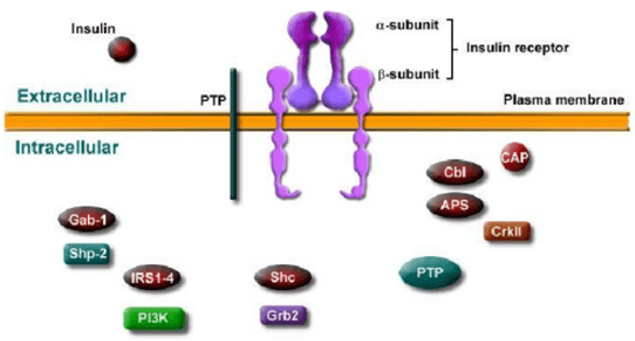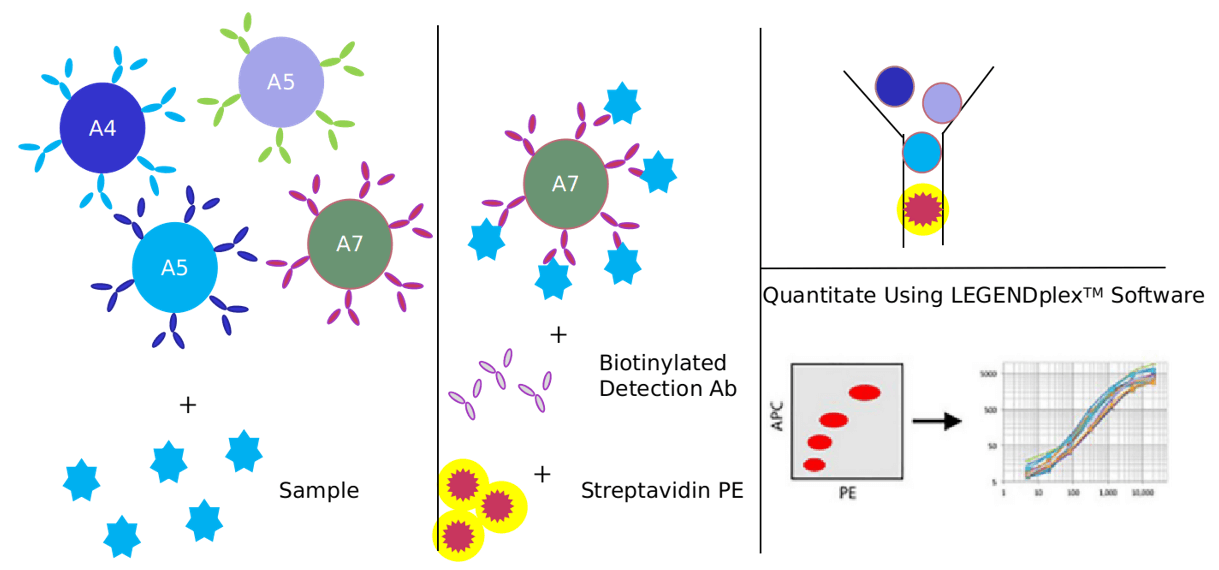Diabetes signaling pathway
Based on Luminex technology platform, Creative Proteomics provides analysis services for key targets of diabetes signaling pathway.
 (Joshi, T., et al., 2019)As the most serious microvascular complication, diabetes mellitus, caused by chronic hyperglycemia, leads to the dysfunction of many cells of the kidney and eventually to the development of renal failure.
(Joshi, T., et al., 2019)As the most serious microvascular complication, diabetes mellitus, caused by chronic hyperglycemia, leads to the dysfunction of many cells of the kidney and eventually to the development of renal failure.
The main pathophysiological alteration of diabetes signaling is insulin resistance in target tissues with insufficient insulin secretion. Among them, impaired insulin signaling plays an important role in the pathogenesis. Therefore, insulin signaling in diabetes is of great importance.
In diabetes, insulin binds to its receptor and causes intracellular signaling through the action of a series of intracellular signaling molecules, which activates two signaling pathways and finally reaches the effectors to produce various physiological effects. Diabetic signaling plays an important role in the physiological effects of insulin. Impaired insulin signaling can weaken the physiological effects of insulin, leading to insulin resistance and affecting diabetic signaling to induce diabetes.
The diabetic signaling system is regulated at multiple levels by different mechanisms and can be cross-linked with the signaling systems of other hormones (growth factors, cytokines) to modulate each other, thus ensuring that the diabetic insulin effect proceeds in an orderly manner according to physiological needs. Abnormalities in different aspects of diabetic signaling can interfere with the physiological function of insulin, leading to insulin resistance.
Diabetes affects a large number of people in the world. Lifestyle, obesity, dietary habits and genetic factors all contribute to this metabolic disease. The target pathway for controlling diabetes is the adenosine 5'-phosphate-activated protein kinase (AMPK) signaling pathway. AMPK affects diabetes signaling, and its activation enhances cellular uptake of glucose and inhibits intracellular glucose production.
Our detectable targets:
| PTP | c-Myc | ULK1 | PFK | PHGDH | Erk1 |
| Shc | LKB1 | LDHA | ANT | VDAC | Bax |
| Grb2 | PDHK | LC3I | PROLC3 | ULK | FIP200 |
| PI3K | VPS34 | UYRAG | NFκB | RIG-1 | TRAF3 |
| CAP | ISGF3 | MSK2 | mTOR | TBK1 | Vav |
| CrkII | IRF9 | AMBRA1 | p38 | RIP1 | TRAF5 |
| Gab-1 | IRS2 | MSK1 | p65 | Tak1 | TLR3 |
| Shp-2 | IRF5 | MEK3 | p38MAPK | SH2 | TRAF6 |
| IRSI-4 | IRS1 | MEK6 | p50 | p53 | TRAM |
| TRIF | IRAK1 | ISRE | PKR |
Technology platform:
We provide Luminex technology for diabetes signaling pathway analysis.
Luminex technology is a multifunctional liquid phase analysis platform, which is developed on the basis of high-speed digital signal processing technology, colored microspheres, applied fluidics and laser technology. The core is the use of fluorescent dyes for encoding. By adjusting the different ratios of different fluorescent dyes, more than 100 microspheres with different fluorescence spectra were obtained. The reactions are carried out on microspheres with different fluorescent codes, such as nucleic acid hybridization, antigen-antibody, enzyme-substrate, ligand-receptor binding reactions. Using laser detection technology, qualitative and quantitative analysis of microsphere encoding and reporting fluorescence.
In addition to Luminex multiplex assay, enzyme-linked immunosorbent assay (ELISA), flow cytometry (FACS analysis) technology can also be provided to meet other customer needs.
Advantages of diabetes signaling pathway detection:
- High sensitivity: The surface area of the microspheres is large, and 100,000 probes can be fixed on each microsphere, which ensures the maximum binding with the target molecules in the sample and improves the detection sensitivity. The lowest detection concentration can reach 0.1pg/mL.
- Strong specificity: Can read the fluorescent signal on a single microsphere, and automatically distinguish between bound and unbound microspheres.
- High accuracy: Without washing, the fluorescence intensity of the reporter molecule on the microsphere is proportional to the bound molecule to be detected. Because the detection range of the Luminex detection platform is large, it does not need to be diluted like ELISA detection, which further reduces errors.

Application of our service:
- Study the regulatory mechanism of diabetes signaling pathway in clinical diseases
- Study the influence of various human viruses on the diabetes signaling pathway
- Study the influence of carcinogenic drugs or therapies on the signal pathway of diabetes
Creative Proteomics has developed a signal pathway target detection platform. We are not limited to providing diabetes signal path detection services, but can also provide other signal path detection services. If you want to detect other targets, please contact us and we will customize the service for you. Look forward to working with you.
References:
- Joshi, T., et al. "Targeting AMPK signaling pathway by natural products for treatment of diabetes mellitus and its complications." Journal of Cellular Physiology, 2019.
- Zhonghua Qi, Yinghui Xu, et al. Baicalein alters PI3K/Akt/GSK3p signaling pathway inrats with diabetes-associated cognitive deficits. lnt J Clin Exp Med, 2018, 8(2): 1993-2000.

